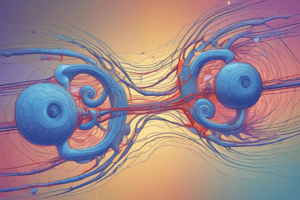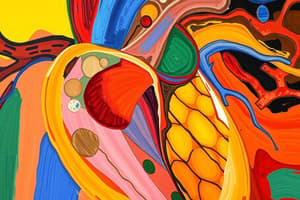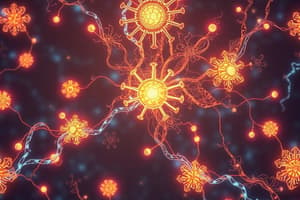Podcast
Questions and Answers
The pink ion can pass through the dark green channel while Na+ cannot.
The pink ion can pass through the dark green channel while Na+ cannot.
True (A)
All channels are equally selective for both cations and anions.
All channels are equally selective for both cations and anions.
False (B)
Gated channels are always open regardless of environmental conditions.
Gated channels are always open regardless of environmental conditions.
False (B)
A channel's conductance is inversely related to the number of opened channels.
A channel's conductance is inversely related to the number of opened channels.
Reversible agonists bind to the ligand locus but do not facilitate the channel opening.
Reversible agonists bind to the ligand locus but do not facilitate the channel opening.
The attraction between K+ and intracellular proteins limits K+ outflux.
The attraction between K+ and intracellular proteins limits K+ outflux.
Phosphorylation-dependent channels can only open or close when a high energy phosphate group binds.
Phosphorylation-dependent channels can only open or close when a high energy phosphate group binds.
The equilibrium potential for potassium is +60 mV.
The equilibrium potential for potassium is +60 mV.
Stretch-dependent channels respond to mechanical changes in conformation.
Stretch-dependent channels respond to mechanical changes in conformation.
Sodium ions tend to diffuse outside the cell due to electrical and concentration gradients.
Sodium ions tend to diffuse outside the cell due to electrical and concentration gradients.
Endogenous agonists are synthesized externally and bind to channels to promote opening.
Endogenous agonists are synthesized externally and bind to channels to promote opening.
The Goldman equation is fundamentally the Nernst equation adjusted for multiple ions.
The Goldman equation is fundamentally the Nernst equation adjusted for multiple ions.
The conductance of sodium is greater than that of potassium despite sodium's higher driving force.
The conductance of sodium is greater than that of potassium despite sodium's higher driving force.
At a membrane potential of -70 mV, the currents of sodium and potassium are perfectly balanced.
At a membrane potential of -70 mV, the currents of sodium and potassium are perfectly balanced.
The membrane potential can vary from -40 mV to -97 mV among different cells.
The membrane potential can vary from -40 mV to -97 mV among different cells.
K+ ions are actively pumped into the cell by the Na+-K+ pump.
K+ ions are actively pumped into the cell by the Na+-K+ pump.
The movement of ions across the membrane occurs solely through active transport mechanisms.
The movement of ions across the membrane occurs solely through active transport mechanisms.
The chemical gradient always overpowers the electrical gradient during the entire diffusion process.
The chemical gradient always overpowers the electrical gradient during the entire diffusion process.
Equilibrium is reached when there is no net movement of molecules across the membrane.
Equilibrium is reached when there is no net movement of molecules across the membrane.
Potassium ions are less concentrated inside the cell compared to outside.
Potassium ions are less concentrated inside the cell compared to outside.
If a membrane is impermeable to a certain ion, diffusion can still occur due to concentration gradient.
If a membrane is impermeable to a certain ion, diffusion can still occur due to concentration gradient.
The net movement of potassium ions stops as soon as the concentration gradient is established.
The net movement of potassium ions stops as soon as the concentration gradient is established.
The electrical gradient is formed as negative charges accumulate inside the membrane due to ion movement.
The electrical gradient is formed as negative charges accumulate inside the membrane due to ion movement.
The flux of positive charges results in the loss of electroneutrality inside the cell.
The flux of positive charges results in the loss of electroneutrality inside the cell.
The resting membrane potential of excitable cells is typically found at -70mV.
The resting membrane potential of excitable cells is typically found at -70mV.
K+ ions are more concentrated in the extracellular fluid (ECF) than in the intracellular fluid (ICF).
K+ ions are more concentrated in the extracellular fluid (ECF) than in the intracellular fluid (ICF).
Excitable cells can alter their membrane potential only at the resting state.
Excitable cells can alter their membrane potential only at the resting state.
The membrane potential is a result of an asymmetric distribution of charges across the membrane.
The membrane potential is a result of an asymmetric distribution of charges across the membrane.
Proteins can freely pass through the capillary bed into the interstitial fluid.
Proteins can freely pass through the capillary bed into the interstitial fluid.
Ion transporters function by allowing ions to diffuse with their concentration gradient.
Ion transporters function by allowing ions to diffuse with their concentration gradient.
An increase in the number of opposite charges separated leads to a higher membrane potential.
An increase in the number of opposite charges separated leads to a higher membrane potential.
Na+, Cl-, and HCO3- concentrations are higher in the intracellular fluid than in the extracellular fluid.
Na+, Cl-, and HCO3- concentrations are higher in the intracellular fluid than in the extracellular fluid.
The equilibrium potential of potassium ions (K+) is approximately -60mV.
The equilibrium potential of potassium ions (K+) is approximately -60mV.
The concentration gradient created by the Na-K pump is crucial for maintaining membrane potential.
The concentration gradient created by the Na-K pump is crucial for maintaining membrane potential.
Resting membrane potential is equal to the equilibrium potential of sodium ions (Na+).
Resting membrane potential is equal to the equilibrium potential of sodium ions (Na+).
The Na-K pump transports three potassium ions (K+) into the cell for every two sodium ions (Na+) it transports out.
The Na-K pump transports three potassium ions (K+) into the cell for every two sodium ions (Na+) it transports out.
Leak channels contribute primarily to the main currents in the membrane potential.
Leak channels contribute primarily to the main currents in the membrane potential.
The conductance for sodium ions (Na+) is higher than that for potassium ions (K+).
The conductance for sodium ions (Na+) is higher than that for potassium ions (K+).
Electrochemical gradients control the direction of ion movement across the membrane.
Electrochemical gradients control the direction of ion movement across the membrane.
Membrane potential remains constant if the Na-K pump is inactive for an extended period.
Membrane potential remains constant if the Na-K pump is inactive for an extended period.
Pumps are more efficient when substrate concentration is lower.
Pumps are more efficient when substrate concentration is lower.
The efflux of Na+ is primarily used to measure the efficiency of the pump instead of K+ influx.
The efflux of Na+ is primarily used to measure the efficiency of the pump instead of K+ influx.
The resting potential is an attribute found only in excitable cells.
The resting potential is an attribute found only in excitable cells.
An increase in external K+ concentration improves the Na+ efflux efficiency.
An increase in external K+ concentration improves the Na+ efflux efficiency.
The magnitude of resting potential is solely determined by the ionic concentration gradient across the membrane.
The magnitude of resting potential is solely determined by the ionic concentration gradient across the membrane.
The electrical equivalent circuit for membrane potentials uses batteries to represent ion channels.
The electrical equivalent circuit for membrane potentials uses batteries to represent ion channels.
Assessing blood during exams provides insights into the health of interstitial fluid due to their communication.
Assessing blood during exams provides insights into the health of interstitial fluid due to their communication.
Excitable cells can change their resting potential to different values during their active phase.
Excitable cells can change their resting potential to different values during their active phase.
Flashcards
Excitable cell
Excitable cell
A cell that can actively change its membrane potential.
Membrane potential
Membrane potential
The difference in electrical potential between the inside and outside of a cell.
Resting membrane potential
Resting membrane potential
The membrane potential of a cell when it is not actively signaling.
Voltage recorder
Voltage recorder
Signup and view all the flashcards
Resting potential value
Resting potential value
Signup and view all the flashcards
Ion Concentration Gradient
Ion Concentration Gradient
Signup and view all the flashcards
Ion channels
Ion channels
Signup and view all the flashcards
Ion transporters
Ion transporters
Signup and view all the flashcards
Leak Channel
Leak Channel
Signup and view all the flashcards
Gated Channel
Gated Channel
Signup and view all the flashcards
Ligand
Ligand
Signup and view all the flashcards
Endogenous Agonist
Endogenous Agonist
Signup and view all the flashcards
Reversible Agonist
Reversible Agonist
Signup and view all the flashcards
Irreversible Agonist
Irreversible Agonist
Signup and view all the flashcards
Selectivity
Selectivity
Signup and view all the flashcards
Conductance
Conductance
Signup and view all the flashcards
Concentration Gradient
Concentration Gradient
Signup and view all the flashcards
Electrical Gradient
Electrical Gradient
Signup and view all the flashcards
Equilibrium
Equilibrium
Signup and view all the flashcards
Electrochemical Gradient
Electrochemical Gradient
Signup and view all the flashcards
Passive Diffusion
Passive Diffusion
Signup and view all the flashcards
Active Transport
Active Transport
Signup and view all the flashcards
Electrical gradient opposing chemical gradient
Electrical gradient opposing chemical gradient
Signup and view all the flashcards
Electrochemical driving force
Electrochemical driving force
Signup and view all the flashcards
Equilibrium potential
Equilibrium potential
Signup and view all the flashcards
Driving force (Fe)
Driving force (Fe)
Signup and view all the flashcards
Passive transport
Passive transport
Signup and view all the flashcards
Ion Currents
Ion Currents
Signup and view all the flashcards
Membrane Permeability
Membrane Permeability
Signup and view all the flashcards
Na-K Pump
Na-K Pump
Signup and view all the flashcards
Na-K Pump and Membrane Potential
Na-K Pump and Membrane Potential
Signup and view all the flashcards
Na+/K+ pump efficiency and substrate concentration
Na+/K+ pump efficiency and substrate concentration
Signup and view all the flashcards
Factors affecting pump efficiency
Factors affecting pump efficiency
Signup and view all the flashcards
Why is Na+ efflux used to measure pump efficiency?
Why is Na+ efflux used to measure pump efficiency?
Signup and view all the flashcards
Membrane permeability and ionic separation
Membrane permeability and ionic separation
Signup and view all the flashcards
Resting membrane potential and ion permeability
Resting membrane potential and ion permeability
Signup and view all the flashcards
Electrical equivalent circuit for membrane potential
Electrical equivalent circuit for membrane potential
Signup and view all the flashcards
Resting vs. Active Potential
Resting vs. Active Potential
Signup and view all the flashcards
Blood tests and interstitial fluid
Blood tests and interstitial fluid
Signup and view all the flashcards
Study Notes
Membrane Excitability: Resting Membrane Potential
- An excitable cell can change its membrane potential.
- Neurons and cardiac muscle cells are excitable.
- Cells have a resting membrane potential (typically -70mV).
- Membrane Potential is the separation of opposite charges across the membrane.
- Ions distribute unevenly. The inside is slightly negative to the outside.
- The electrical potential is measured using microelectrodes.
Ion Distribution in ICF and ECF
- Na+, Cl-, and HCO3- are more concentrated in the ECF.
- K+ and proteins are more concentrated in the ICF.
- Ions cross the plasma membrane via channels or transporters.
- Ion Channels: Passive transport, allow ions to diffuse down their concentration gradient. Selective permeability.
- Ion Transporters (pumps): Active transport, move ions against their concentration gradient.
Ion Channel Types
- Leak Channels: Always open, allow passive ion flow.
- Gated Channels: Open or close in response to stimuli (e.g., voltage, ligand).
Gated Channels: Mechanisms
- Voltage-dependent channels open/close due to membrane voltage changes.
- Ligand-dependent channels open/close in response to a signaling molecule (ligand) binding.
- Mechanical channels open/close due to physical force.
Driving Forces for Ion Movement
- Chemical gradient: Movement down the concentration gradient (high to low concentration).
- Electrical gradient: Movement based on charge difference (opposite charges attract).
- Electro-chemical gradient: Combined influence of chemical and electrical gradients.
Resting Membrane Potential
- The resting potential is determined by the permeability of the membrane to different ions (K+, Na+, Cl-)
- The resting membrane potential is related to the equilibrium potential for the ion
- The equilibrium potential for an ion is the membrane potential at which the net flow of the ion across the membrane is zero. This means the electrochemical and chemical gradients for the respective ion are balanced.
Nernst Equation
- Used to calculate the equilibrium potential for a given ion.
Goldman-Hodgkin-Katz (GHK) Equation
- Calculates the membrane potential based on the permeabilities of multiple ions.
Clinical Significance
- Imbalances in ion concentrations (e.g., potassium) can affect nerve and muscle function.
- Blood tests are used to measure electrolytes (ions).
Studying That Suits You
Use AI to generate personalized quizzes and flashcards to suit your learning preferences.




